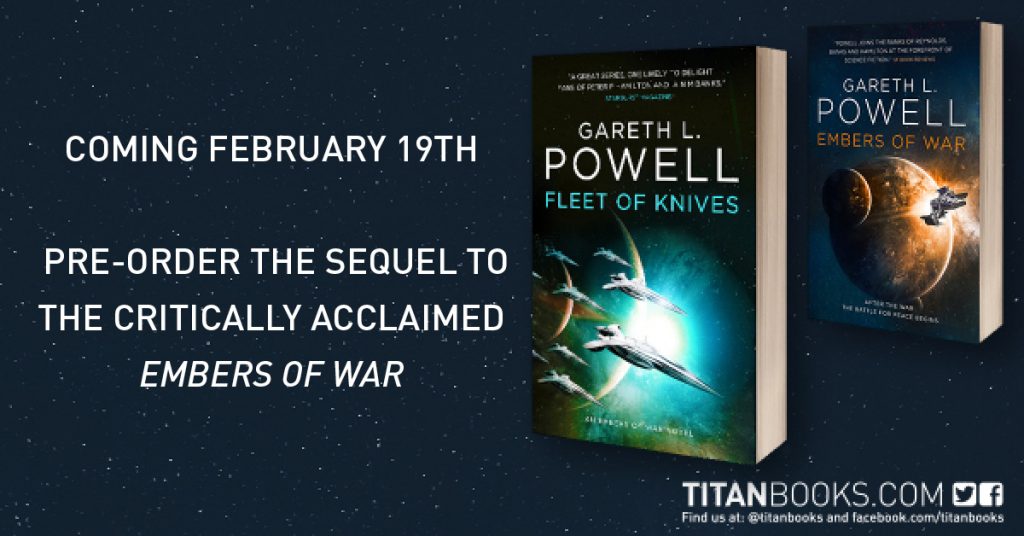GARETH L. POWELL is a speculative fiction author from the UK. He has won the BSFA Award for Best Novel and been shortlisted for the Seiun Awards in Japan. His novels and novellas have been published in the UK and US by Solaris, Titan Books, and Tor.com Publishing.
His short fiction has appeared in Interzone, Clarkesworld, and Gardner Dozois’s Year’s Best Science Fiction, and his story ‘Ride The Blue Horse’ was a finalist for the 2015 BSFA Award.

Gareth was born and raised in Bristol, UK, and was once fortunate enough to have Diana Wynne Jones critique one of his early short stories over coffee. Later, he went on to study creative writing under Helen Dunmore at the University of Glamorgan.
Gareth has run creative writing workshops and given guest lectures at UK universities, been a guest speaker at the Arvon Foundation in Shropshire, and given talks about creative writing at various literature festivals around the country.
His nonfiction book About Writing is an essential field guide for aspiring authors.
Gareth has also written for The Guardian, The Irish Times, 2000 AD, and SFX. He has written scripts for corporate training videos, and is currently at work on a screenplay.

GJ: I discovered you and your writing through Twitter, I can’t remember exactly how, but I asked you which of your novels I should read first. How important is social media and interaction with your audience to you as an author who by tradition would normally hide away and pop their head out of their retreat only when dragged out by the publisher a month or so before the release of a new piece of work?
GLP: Twitter is hugely important to me. Writing can be a solitary occupation, and so Twitter is like my office water cooler: it’s the place I can go to chat with friends and colleagues and find out what’s happening in the industry. It’s also a way of connecting with readers. When I was a kid, there were several authors I would have loved to ask a question, but in those days you had to sen a letter to a publisher and hope someone there would pass it on. Now, readers can log onto Twitter and ask what they like. It makes for a more dynamic relationship between writer and audience.
GJ: If Twitter had been around when you were growing up, who would you have liked to ask a question and what would that question have been?
GLP: As a teenager in the 1980s, I was a big fan of Larry Niven’s Known Space series. I guess I would have bugged him with dozens of questions about the Ringworld and the various characters and inventions in his stories.
GJ: You’re very open about your continued struggle to remain a full-time author and ask for support in the form of Patreon, of which I am one of your supporters in return for access to behind the scenes of your writing life. How naturally does that openness come to you and do you think as your success grows, you will maintain that aspect?
GLP: Setting up a Patreon page felt very alien to me. I have that whole British thing where you don’t talk about money, and you certainly don’t ask for charity. But I’ve been through a few tough times financially, and there are other circumstances which mean I need to be home for my children, so returning to full-time work hasn’t been feasible. I freelance where I can, but having a small monthly income from Patreon has been a lifesaver. But the minute I can start supporting myself without help, I will instantly (but very gratefully) close my Patreon account.

GJ: Can you describe your journey to first publishing a novel, along with how you were signed up by your literary agent?
GLP: My first novel, Silversands, came about as the result of having a short story published in Interzone. I was approached by Pendragon Press who asked to publish it. Then, a year later, I was introduced to Jon Oliver at Solaris and pitched him The Recollection, which he liked. The rest, as they say, is history.
I was signed by my current agent (Alexander Cochran at C&W) after my fourth and final book for Solaris. He gave me a lot of good feedback as I was writing Embers of War, and secured the deal with Titan Books.
GJ: After reading Embers of War, which I would describe as a fast-paced, adventuring space opera, I duly fell for the protagonist, Trouble Dog, a sentient space warship who has turned her back on violence and instead works as a lifeboat roaming the galaxy to help those in need. What can we expect from the rest of the series?
GLP: In the rest of the series, the events of Embers ripple out with unforeseen consequences, and Trouble Dog finds herself caught between the forces of Order and Chaos.
GJ: You have a busy year of releases coming up in 2019, of which I’m itching for Fleet of Knives, the second in the Embers of War series, plus you have the non-fiction book About Writing and Ragged Alice, a horror novel coming out too. Each of these is completely different to the next, do you see yourself continuing to concentrate on any particular genre in the future or do you enjoy moving around?
GLP: I see myself primarily as a science fiction author. My goal is to be the next Iain M Banks or Peter F Hamilton. But at the same time, I read widely and have a wide range of interests, so I will continue to write things beyond the usual scope of the genre.

GJ: The novels I mentioned already have all been written, including the final in the Embers of War trilogy, so what are you working on now?
GLP: At the time of this interview, I’m planning a new science fiction series, writing notes for a more conventional thriller, and co-writing a novella with another author. And in my spare time, I’m working on a screenplay.
GJ: If you weren’t an author what do you think you would have been an alternative career?
GLP: Before the recession in 2008, I worked in software marketing for almost ten years, so I guess I would still be doing that.
GJ: Did you aspire to be an author at a young age?
GLP: I can’t remember a time when I didn’t want to be an author. I just never knew how to make it happen.
GJ: At what point in your life did you consider yourself to be an author, as opposed to someone who wrote in their spare time?
GLP: Due to company restructuring, I left full-time employment in 2008. Since then, I’ve been scraping a living writing fiction and taking on freelance copywriting projects. So, I guess that must have been the point — when I realised my ass was on the line.
GJ: Again looking forward to the year ahead which we’re rapidly getting into already, apart from the release of your books, what events or milestones will you be looking forward to this year?
GLP: 2020 is going to be a big milestone for me. It will mark not only the publication of my twelfth book, Light of Impossible Stars, but also my 50th birthday, and the 10th anniversary of the publication of my first novel, Silversands.
GJ: Finally, I’d like to end with a question I always ask people I interview. What advice would you give to an aspiring author?
GLP: Write first, edit later. Get the story down before you start fussing over the first chapter, or you’ll never finish it.
Thank you Gareth for taking the time to talk with me today. I’m very much looking forward to Fleet of Knives which comes out on 19th Feb 2019 and you can pre-order now (I have!) Gareth is worth following on Twitter, plus you can connect via Facebook and his website.
If you enjoyed this interview then why not subscribe to my mailing list to be notified of every article I post. I regularly interview authors and those in the publishing industry, along with providing an insight into my own experiences of publishing my debut novel, In The End, an apocalyptic thriller that will leave you breathless.
I rather enjoy your author interview series, although I never comment (and often forget to hit that Like button) because no one else seems to comment much on these particular posts. Makes me wanna write more fiction, something besides my usual political commentary and nonsense poetry, although I have no intention of ever publishing any novels. I’m far too private for all that.
Out of curiosity, are your interviews by phone, email, in person….?
LikeLiked by 1 person
It’s great when people do comment so that thanks. They’re done by email in a few way, mostly conversation style, unlike my first ones which were just a bunch of questions. You should give fiction a go. Write for yourself and if you do want to share you can always publish under another name.
LikeLiked by 1 person
I always seem to get bogged down in worldbuilding hell! Not so much anymore, now life is just a little too hectic to get lost in fantasy. Which is probably exactly why I should….
Which is probably exactly why I should….
Any advice for email interviews? Things NOT to do or say? I’ve pondered an interview series since I started this blog, just various people from different walks of life, and my first attempt was a total disaster. Which is an exaggeration, but I’ve always been my own worst critic.
LikeLiked by 1 person
I would suggest you research them a bit so you can ask some questions a little deeper below the surface. Generally though I find people are just will to talk
LikeLiked by 1 person
Yes, definitely research! Rather not ask questions they’re probably sick of hearing! I just want to walk that fine line between “professional” enough, but not overly stiff or formal. Which I’m pretty bad at!
LikeLiked by 1 person
Hi GJ,
Another good spotlight on an author. Taking notes.
Gary
LikeLiked by 1 person
Thanks Gary
LikeLike